The spoons in this exhibit were to promote a specific person or cause. Oftentimes the symbolism is obtuse and we must study history to understand the spoons and the times that produced them.
To our way of thinking, a spoon is about as apolitical as one could imagine. But this was not always the case. In the 1700's the English would sometimes decorate spoons with political symbols to show their loyalty to either a ruler or a cause. Thus the precedent was set.
Political issues in the 1890's were very high profile and the average citizen paid much more attention to these events than most current citizens. Thus when the souvenir spoon movement began, it was logical for some causes to have spoons manufactured favorable to their point of view.
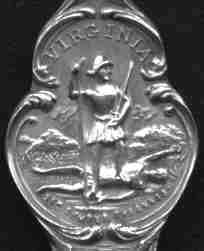
"sic semper tyrannus"
"Thus always to tyrants"
The Virginia state seal
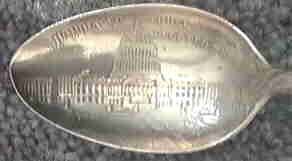
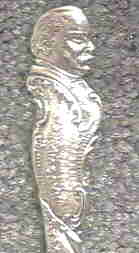
President Cleveland inaugural souvenir. Bowl says "nominated three times elected twice" with a picture of the capitol building. I don't know why they use the Capitol building rather than the White House. Under Cleveland's profile it says "inaugerated March 4th 1885 1893". Cleveland is the only American President to serve two non-consecutive terms.
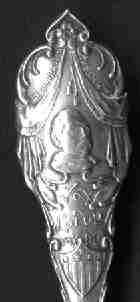

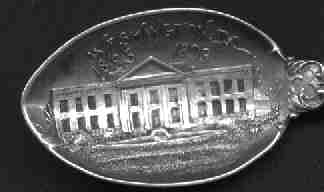
Another Cleveland inaugural spoon. The finial has his portrait and other symbols. The stem says he received 5,554,561votes and a picture of the White House in the bowl. Note: the White House now looks different because of changes made by Truman and Eisenhower.
According to my encyclopedia, Cleveland received 5,556,918 votes (probably later) and defeated Benjamin Harrison who received 5,176,108 votes
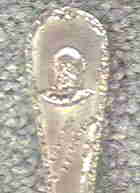
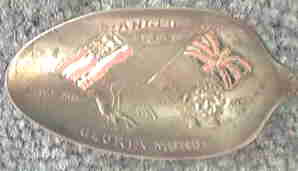
"The right Hon E. Gladstone M.P." "Anglo Saxon--one aim--one goal"
This silver plated spoon has an enameled American and British flag, The American Eagle and British Lion and the latin words "gloria mundi"--glorious world. Was the goal world domination?
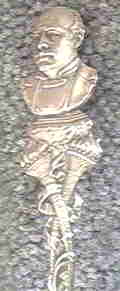 Robert
Ingersol-sugar bowl spoon
Robert
Ingersol-sugar bowl spoon
A Republican lawyer, politician and writer noted for attacking orthodox Catholic beliefs and a speech in favor of James Blaine, the Republican presidential candidate. The torches under his profile contain the words "Liberty" and "Reason"
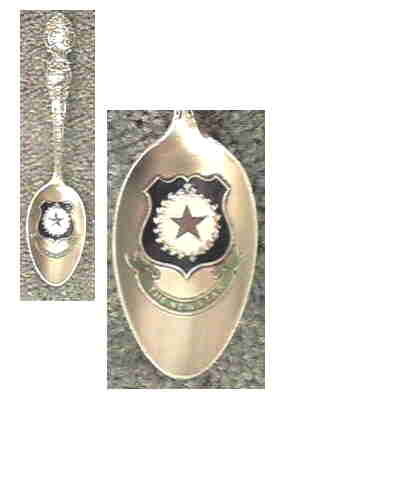
This particularly nice spoon salutes Oklahoma Statehood. The enameled bowl says "THE NEW STAR" and a conventional multi-scene Oklahoma State handle was used. Oklahoma became a state on November 16, 1907.


Spoon commemorating Hawaii's admission to the Union as the 50th state on August 21, 1959. Many different items were used to commemorate this event, but a sterling spoon is rather unusual at this point in time.

Is this spoon a political statement?
At first glance most would say no. But on the back the year "1933" is engraved. That year was the worse year of the Great Depression and much of the country was also experiencing poor harvests. Someone bought this "basket of plenty" spoon advertising California as the "land of plenty".
I just acquired this spoon almost by accident. I overlooked it twice, but then for some unknown reason I picked it up and looked at the reverse.

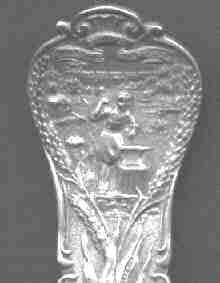
The basic spoon is a common state seal from Nebraska with a gold washed bowl and a name "Cora E. Neff 1901" engraved in the bowl. Normally I would not be interested in this spoon.
But when I turned it over, the back of the bowl was engraved "16 to 1 anti-imperialism"

sorry the scanner did not want to pick up all the detail on this curved surface.
That inscription caught my attention. The meaning behind it became apparent only after quite a bit of research.
"16 to 1" This was the ratio of silver to gold that the Democrats wanted and it was eventually enshrined into law. (16 ounces of silver is equal to one ounce of gold).
"anti-imperialism" This took me a little longer to figure out. The 1900 presidential election was between William McKinley and William Jennings Bryan. This was shortly after the Spanish American War and we had troops occupying the Philippines, Cuba, and Puerto Rico.
This was new for Americans as these were our "first" territories. The local Philippino's, however, wanted to be independent. There was an armed insurrection against our troops, and Bryan accused McKinley of being an "Imperialist". Then during the course of 1900, A group of Chinese locals called "Boxers" decided to get rid of the foreign nations (mainly European) that were dividing up China. They were killing missionaries and then they trapped a large number of foreign (European) diplomats (and families) in their residential compound. McKinley, without congressional approval, diverted troops from the Philippines to China and they marched on the compound and routed the "Boxers" thus saving the diplomats. This was also considered to be an Imperialist act.
Thus Bryan was known as the "anti-imperialism" candidate.
Back to the "16 to 1", Bryan wanted the treasury to produce silver money, rather than just gold money. There was an abundance of silver and this coinage would create moderate inflation which would benefit the farmers and small merchants at the expense of the large bankers. Thus both of these phrases were from the Bryan political campaign.
Also Bryan made his home in Lincoln, Nebraska.
Enough of background. There is more to the spoon, but I do not have enough details yet. The back of the stem is also engraved "Arthur G. Wray". I haven't yet been able to trace either Wray or Neff conclusively, but at this time I suspect that Wray was an important person in Bryan's campaign and that Neff worked for him. I suspect that this spoon was a gift to Neff to thank her for her work during the campaign.
Thus any spoon could be made into a political commemorative based upon circumstances.
On the opposite side of this campaign, Wm Mc Kinley was known as the "sound money candidate". This spoon was to commemorate his position.
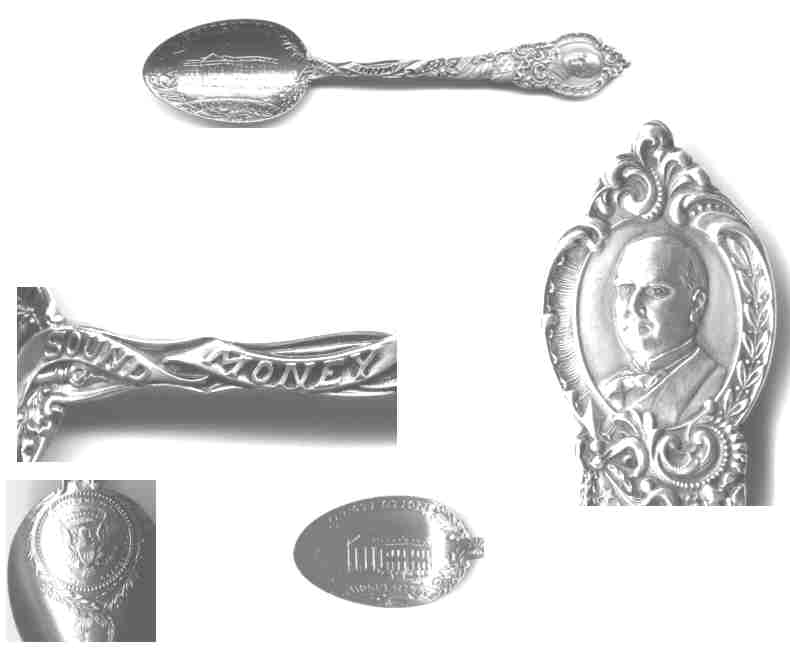
This tea sized spoon has a portrait of McKinley at the top just above the symbol for the flag. Near the bottom of the stem it says "sound money". The bowl shows a picture of the White House and says "Protection" and "Prosperity". The back of the bowl has a really neat picture of the Presidential seal. Patented by Moore and Leding in 1897 but manufactured by Dominick and Haff.
Although McKinley won the election, eventually Bryant's views became the law of the land. Today, our government does not seem to understand the concept of "sound money". If you look at a chart of the value of the dollar since this time, our current dollar is worth about the equivalent of two cents in 1898 dollars. That my friends, is destruction of wealth by the insidious effects of inflation.
Return to Souvenir Spoon World home page